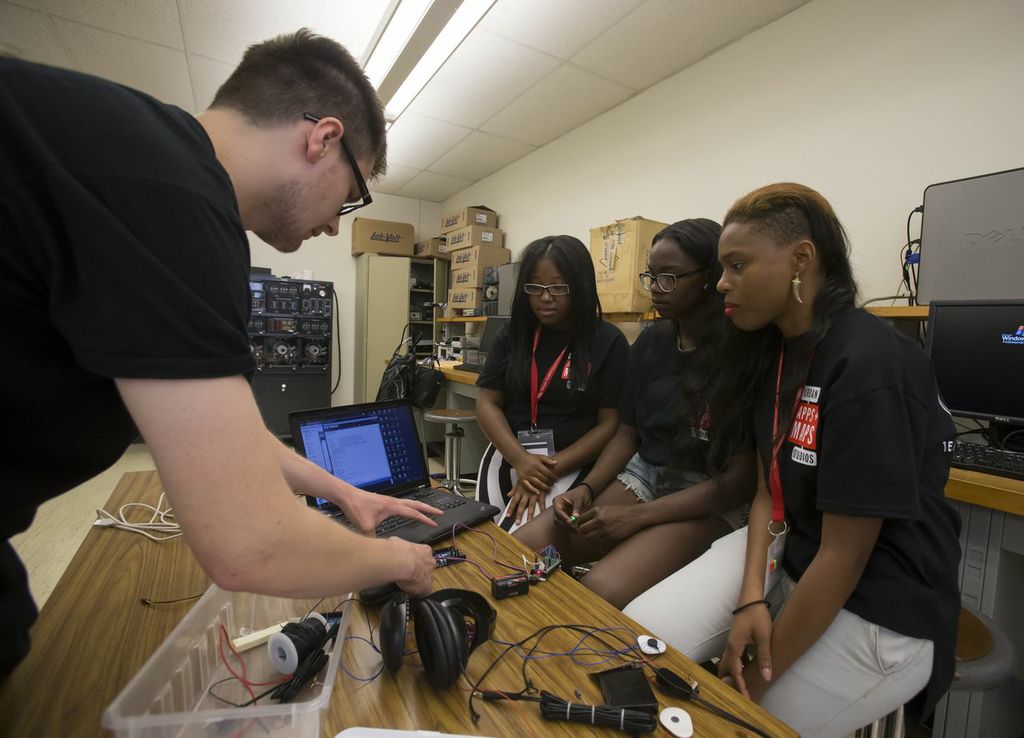
Local kids are building Philly’s future, one app at a time
Photo credit: Elizabeth Manning/Temple University
Knight Foundation supports the Urban Apps and Maps Studio to foster diversity in Philadelphia’s tech community and inspire young people from the city’s low-income neighborhoods with solutions for solving the city’s problems.
If you have a problem and can’t come up with a solution, I suggest you take it to Temple University’s Urban Apps and Maps Studio. The 130 Philadelphia teens who participated this summer seem capable of solving anything. Thursday I attended their demonstration day, and when I heard Lencys, a Frankford resident and 10th grade public school student, say that she was proud to be a part of history, I knew these young people had come up with some good ideas.
Over the past six weeks, all of the students did research and fieldwork in the community, learned principles of design and basic coding (Ruby and HTML), and developed prototypes. The demonstration day was their opportunity to show what they had learned, what problems they had tackled and what solutions they had developed. They learned from Temple faculty and students in architecture, art, business, computer science, design, English and engineering. The faculty, undergrads and grad students were as excited as the high school kids.
A group of about 10 students shared their mockups for reuse of vacant lots in Old City, Fairmount and North Philadelphia. Two of them said they originally thought there wasn’t anything they could do to help their city, so it felt amazing to contribute ideas that might make a difference. In fact, Moira Baylson, deputy director for the Philadelphia Office of Arts, Culture and the Creative Economy, was so excited that she wanted the students to get started with their plans immediately.
The groups that just blew me away were those that did not know coding before entering the program six weeks ago but developed tech solutions anyway: GotCha, Heart Rate Headphones, Philly Data and Philly YC2.
- GotCha is a mobile app that allows the owners of retail stores to report shoplifting in real time to the police and to other GotCha subscribers. The owners can describe the suspects and what was stolen. Gotcha is already attracting interest from a storeowner and Navarrow Wright, former CTO for Interactive One, who attended the demo day.
- Heart Rate Headphones is an app and a prototype device that monitors a person’s heart rate during exercise and picks motivational music from their smartphone. Last week the team was featured on KYW Newsradio and the Fox 29 morning show here in Philadelphia.
- Philly Data: Wright has invited the team, which used open data and a Google Maps API to create a geolocation app, to join him at a meeting with Google. Wright said it is widely known that minority urban audiences don’t use foursquare; in fact, none of the students had even heard of it, so there’s an opportunity.
- PhillyYC2 (Philly Youth Community Connection) is a mobile app that connects students to resources to help them prepare for college and find jobs. This idea originated from recent school budget cuts that eliminated guidance counselors. The Philadelphia College Prep Roundtable, a group of professionals in the college preparation, access and retention field, plan to invite the team to present at their upcoming professional development conference, Aug. 19-20.
Knight Foundation made a grant last year to expand the Urban Apps and Maps Studio program at Temple. It’s a way to get more young people from Philadelphia’s low-income neighborhoods involved in solving local problems. Over the next couple of years, hundreds of students will take part in the summer program and then some will become year-round fellows working to solve problems in Philadelphia by learning technology and human-centered design. It’s having a lasting impression on many of the kids.
One of the most impressive students I met was named Kory, an 11th grader. He is really into theater and creative writing. Looking ahead to college in a couple of years, he thought he might major in theater and minor in English. Urban Apps and Maps has changed that. Now that he’s learned to code, he still plans to major in theater, but his minor will be in computer science. After seeing his enthusiasm, though, I think he’ll be majoring in computer science and minoring in theater by the time he goes to college—and he’ll likely come up with some amazing idea to solve some problem that we’ve been wrestling with for years.
Donna Frisby-Greenwood, Philadelphia program director at Knight Foundation
Recent Content
-
Community Impactarticle ·
-
Community Impactarticle ·
-
Community Impactarticle ·


